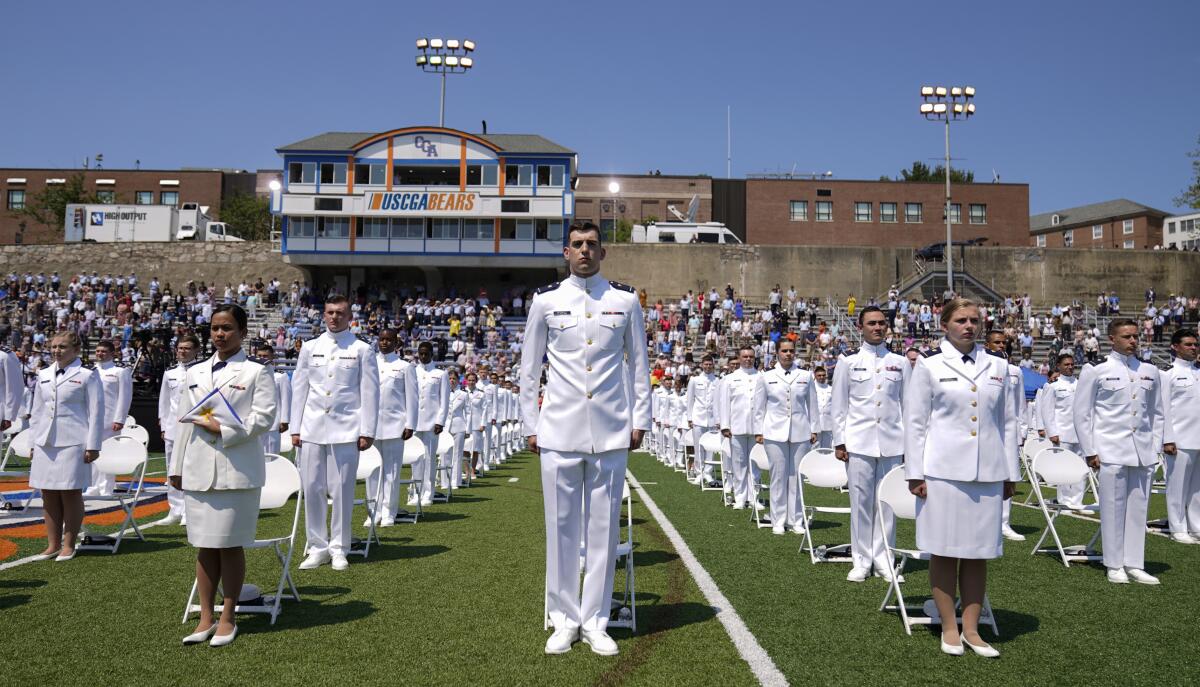Expelled Coast Guard cadet from Whittier sues over policy banning parents

- Share via
A cadet who was expelled from the U.S. Coast Guard Academy after becoming a father filed a federal lawsuit Wednesday challenging the school’s policy that prohibits students from being parents.
In 2014, Isaak Olson was in his senior year at the academy in New London, Conn. Two months before the Whittier resident was to graduate with a degree in mechanical engineering and a commission as an officer, he disclosed to the school’s administration that his fiancee had given birth to their first child the previous year, according to the lawsuit filed Dec. 8 in U.S. District Court in Connecticut.
The academy expelled Olson under a regulation that requires cadets to either resign or be “disenrolled” if they incur a “parental obligation” for a child or pregnancy beyond 14 weeks, according to the lawsuit.
The ban was introduced in the late 1970s, just after the academy began admitting women.
“The decision to become a parent is deeply personal, and no school or job should be able to interfere with that choice,” Elana Bildner, an ACLU of Connecticut staff attorney representing Olson, said in a statement. “The U.S. Coast Guard Academy’s archaic regulation, which forces cadets to choose between parenthood and their degrees, has been morally wrong and unconstitutional since its inception.”
Olson met his girlfriend when they both attended La Serna High School in Whittier. They continued their relationship after he enrolled at the academy and she at Westmont College in Santa Barbara. They planned to marry upon graduation.
He learned of his fiancee’s pregnancy in April of his junior year, according to the lawsuit. She decided not to have an abortion, and he decided not to resign because that would have meant allowing the academy to recoup the cost of his education, estimated at up to $500,000, according to the lawsuit.
His fiancee gave birth in August 2013 in California; Olson was present at the birth, then returned to Connecticut for his senior year.
Seven months later, in March 2014, Olson was filling out the screening application for his first duty assignment, aboard a Coast Guard cutter. It was the first time he had been asked about dependents, and he disclosed that he had a child, according to the lawsuit. He was then told he would not graduate or receive a commission.
The couple, in an effort to resolve the matter and allow him to graduate, had Olson’s parental rights terminated, according to his attorneys. The academy nonetheless refused his appeal.
During the administrative limbo of the following months, Olson was initially forbidden to marry his fiancee, as he was technically still a cadet and thus required to remain single. Days before the planned wedding, in June 2014, he was told by the academy that he could go ahead with it.
He was never given a hearing and was “disenrolled” from the academy, according to the lawsuit. The academy ultimately did not seek to recoup the cost of his education.
Olson enlisted in the Coast Guard shortly after his expulsion. Now 29, he is an aviation maintenance technician stationed in Alaska. He and his wife have a second child, born in 2016.
He decided to sue after going through a lengthy administrative process in a effort to get his status restored, Bildner said. He is seeking his commission and back pay as part of the lawsuit.
The curriculum, the discipline, the physical fitness programs are tough.
Olson and his family receive about $3,000 less per month than they would have if he had been granted his commission as an officer, according to the lawsuit. He has applied to officer candidate school, but, lacking a college degree, was rejected.
The case is expected to have implications at other service academies, which have similar policies, according to the ACLU.
“We believe such bans are wrong for every military service academy and that the academies should strike them from their regulations,” said Linda Morris, a staff attorney with the ACLU Women’s Rights Project.
A bill introduced in the U.S. Senate this summer by Sen. Ted Cruz, a Texas Republican, and Sen. Kirsten Gillibrand, a New York Democrat, would mandate an end to policies that force students in military academies to withdraw or give up their children if they become pregnant.
“This policy is unfair, antiquated and unacceptable,” Cruz said at the time.
More to Read
Sign up for Essential California
The most important California stories and recommendations in your inbox every morning.
You may occasionally receive promotional content from the Los Angeles Times.










